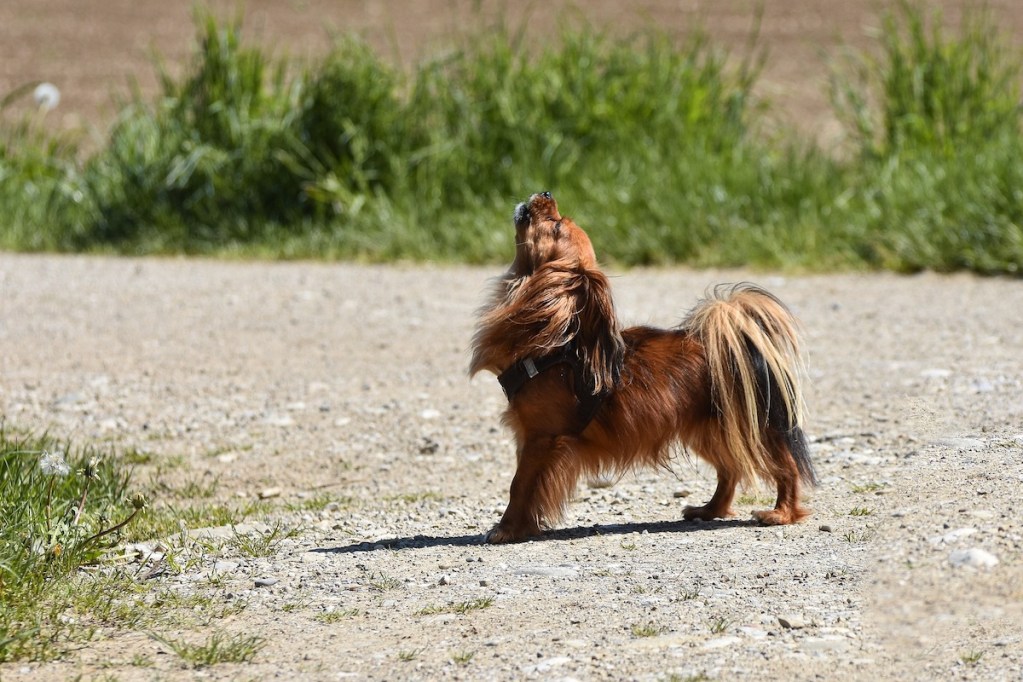While your beloved pup’s ancient ancestors may have howled at the moon, there’s nothing more annoying than being jerked awake by your dog barking at a siren. As much as you might immediately jump in and try to correct the behavior, remember that this response is rooted deep within a canine’s DNA. They might not fully be able to help it, though positive reinforcement training can temper these responses. So why do dogs howl at sirens? We’ll dive into this phenomenon.
The history of the howl

Wolves may have been howling for millennia and have lived in North America for at least 15,000 years. When dogs evolved about 30,000 years ago, by some estimates, they took the howl with them. This practice almost certainly began as a way to communicate with others of the pack over long distances and occasionally to scare away predators or even other wolves.
Today, you might hear your beastie let out a howl for all sorts of reasons, including loneliness, boredom, anxiety, and excitement. But howling at sirens is a little different.
Why do dogs howl at sirens?

There are a few reasons why your animal might respond to a siren in the wolfiest way possible. If you’re looking to curb the behavior, it can actually help to narrow down the cause. The next time you hear a siren, try to suss out why your pet decides to sing along.
Protecting their territory
Lots of breeds were created as guard dogs and have a fierce protective instinct. Even those that don’t have this aptitude in their pedigree still might have a bit of the urge to keep enemies away from their family. Some dogs may interpret the sound of an approaching siren as a threat. After all, they don’t realize that the fire truck is helping someone out there.
Signaling to other dogs
Dogs evolved to howl to each other and they might actually be talking to the siren when they hear it. That’s because a buddy who’s been separated from their pack needs a way to find their way home, hence the howling. Today, their pack usually means you, but they could be calling out to the siren just in case.
Fearing the noise
Lots of dogs howl or bark in fear, and it isn’t limited to sirens. You might have a pup pup that barks at construction, planes, thunder, or even the ice maker. Sirens are intentionally loud and piercing, meaning a dog (that already has very sensitive hearing) could find themselves shaking in their booties.
Responding to stimuli
Lastly, your bud howling is often in response to other dogs howling, so similar stimuli might trigger the impact, even though they realize it’s not actually a dog out there. If your four-legger frequently barks or howls at the TV, the beeping microwave, or your alarm clock, it could be a reaction to noise more generally.
How to get your dog to stop howling

It can help to narrow down the why behind your best friend’s howling in order to discover the proper training regimen for them. For example, a dog responding out of fear might behave differently than one that’s gone into protection mode. No matter the root cause, many barky dudes benefit from learning the command “quiet,” which tells them to stop making noise. You can introduce that by giving a gentle correction, often right before the vocalization, and then praise them for keeping it down.
Hopefully, your pet eventually learns to listen when you ask them to stop, whether that’s howling at a siren or yelling at the neighbor dog. In some cases, an anxious animal might never fully get over this behavior. In that case, just hope you don’t live next to a fire station.
Final thoughts

While howling goes back many generations, it’s only recently that dogs could use it as a way to talk to sirens. If your dog frequently cries to the passing ambulance, you don’t have to worry too much, but a few training sessions will likely convince your furry friend to take it down a few notches. Certain breeds can be especially prone to howling, including beagles, huskies, and dachshunds, so know what you’re signing up for before bringing home a particularly loud breed.
Some dogs also feel better in the crate or another enclosed space — a tool that only works if you have a way to predict when a siren will be coming your way. Eventually, Fido will likely realize that the siren poses no threat and let it go along.




